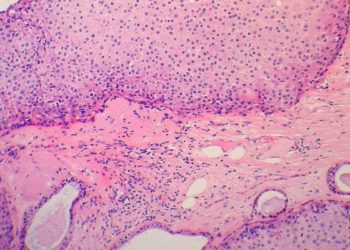Colchicine may lower the risk of cardiovascular events in patients with coronary disease
1. Patients who received low-dose colchicine daily had a ~30% lower risk of cardiovascular events compared to those who received placebo.
2. Although the incidence of cardiovascular death was similar between groups, the colchicine group had a numerically greater number of non-cardiovascular deaths as well as all-cause deaths compared to the placebo group.
Evidence Rating Level: 1 (Excellent)
Study Rundown: Colchicine is an anti-inflammatory drug that exerts its effects through inhibition of microtubule assembly, thereby reducing inflammasome activation and modulating leukocyte responsiveness. The Colchicine Cardiovascular Outcomes Trial (COLCOT) found that daily use of colchicine soon after myocardial infarction reduced the risk of further ischemic cardiovascular events and the previous Low-Dose Colchicine (LoDoCo) pilot trial found that patients with stable coronary disease who received colchicine were significantly less likely to experience acute cardiovascular events compared to those who did not. This randomized, placebo-controlled trial, termed LoDoCo2, confirmed the association between colchicine use and decreased risk of cardiovascular events using a patient population that was roughly 10 times larger than the first. This benefit became detectable early in the study and persisted with no attenuation over 5 years of treatment. Adverse events such as cancer, infection, pneumonia, and gastrointestinal upset occurred at similar rates between groups. While not quite statistically significant, the incidence rate of non-cardiovascular death was higher in the colchicine group compared to placebo. This study circumvented many weaknesses of the original LoDoCo trial, including a small sample size and the lack of placebo control, but some limitations still remained, such as the lack of data on blood pressure, lipid levels, and biomarkers of inflammation. Overall, the results of the LoDoCo2 trial lend further support to the effectiveness of colchicine in reducing the occurrence of cardiovascular events in patients with chronic coronary disease.
Click here to read the study, published today in NEJM
Relevant Reading: Low-Dose Colchicine for Secondary Prevention of Cardiovascular Disease
In-Depth [randomized controlled trial]: In this multicenter study beginning in August 2014, 5222 patients between 35 and 82 years of age with evidence of coronary disease entered a 1-month open-label run-in phase before being randomly assigned in a 1:1 ratio to either continue receiving 0.5 mg colchicine daily or begin receiving placebo. Patients with moderate-to-severe renal impairment, severe heart failure, or severe valvular heart disease were excluded. The primary endpoint, a composite of cardiovascular death, spontaneous myocardial infarction, ischemic stroke, and ischemia-driven coronary revascularization, occurred in 187 patients (6.8%) in the colchicine group and 264 patients (9.6%) in the placebo group (incidence, 2.5 vs. 3.6 events, respectively, per 100 person-years; hazard ratio [HR], 0.69; 95% confidence interval [CI], 0.57 to 0.83; P<0.001). This effect was consistent across subgroups defined according to age, sex, smoking status, diabetes, renal function, hypertension, and statin dose. Between-group differences were also detected in the first five pre-ranked secondary endpoints, all of which were different combinations of the individual components noted above (P<0.01 for all). However, both groups had similar cardiovascular mortality (20 vs. 25 fatalities; HR, 0.80; 95% CI, 0.44 to 1.44), non-cardiovascular mortality (53 vs. 35 fatalities; HR, 1.51; 95% CI, 0.99 to 2.31), and all-cause mortality (incidence, 0.9 vs. 0.8 events, respectively, per 100 person-years; HR, 1.21; 95% CI, 0.86 to 1.71).
Image: PD
©2020 2 Minute Medicine, Inc. All rights reserved. No works may be reproduced without expressed written consent from 2 Minute Medicine, Inc. Inquire about licensing here. No article should be construed as medical advice and is not intended as such by the authors or by 2 Minute Medicine, Inc.







